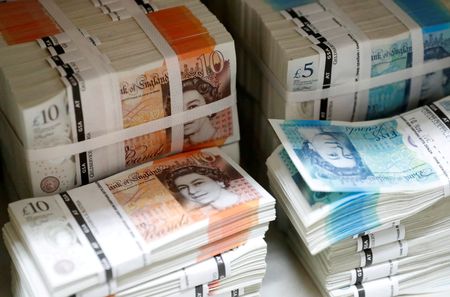
Analysis-Locked Russian assets add to war woes for British pension funds

By Carolyn Cohn and Iain Withers
LONDON (Reuters) – British pension fund managers are writing off billions of pounds of frozen Russian assets held for their members as they run out of options to sell them safely, adding to the risks to their funding positions from Russia’s invasion of Ukraine.
The funds have in many cases marked those assets down in value, after the invasion last month – which Russia calls a “special military operation” – led to rounds of sanctions by Western governments and countermeasures by Russia. There are around two trillion pounds ($2.64 trillion) of assets in defined benefit, or final salary pension funds, which provide a guaranteed income in retirement for millions of workers including refuse collectors, supermarket staff and bank tellers.
Pensions trade bodies and major pension funds contacted by Reuters said Russia investments likely accounted for up to 0.5% of pension holdings in Britain, or 10 billion pounds. Many pension funds are in deficit after years of ultra-low interest rates curbed gains in their investments. But their funding levels improved during the COVID-19 pandemic, as economic stimulus in response to the virus lifted asset prices. Now the invasion is providing some shocks.
“As soon as the conflict happened, actually most investment managers have written that (Russia) investment down to zero,” David Fairs, executive director of regulation policy at The Pensions Regulator (TPR), told Reuters. “The bigger impact is what’s happening to inflation, to the markets, what’s happening in terms of energy prices, what’s happening to supply chains,” he added.
As well as the hit to pension fund investments, the war’s economic ripples could affect the financial strength of the companies backing the pension schemes, he said. A poll of 2,000 UK adults from campaign group Make My Money Matter found this month that 86% of people want their pension schemes to get out of Russia. But with tit-for-tat restrictions snarling up trading and payment systems, it’s not easy to sell.
“You can make the decision in principle (to sell), but actually you can’t trade in all likelihood at the moment,” Fairs said. Even if you can find a buyer, strenuous due diligence is needed to check who you’re selling to. “If it’s a bargain basement price, it’s probably an oligarch trying to buy it,” said a source at one major pension fund. “It might be as bad to sell it at 1 cent in the dollar to an oligarch as holding onto it for now.”
Asset managers are also struggling to exit Russia, many of which are managing money on behalf of company and local government pension schemes. Many funds with heavy Russian exposure have been frozen since shortly after the invasion, after Russia suspended its stock market. Major funds centre Luxembourg last week said two-thirds of such funds are frozen.
The situation may become a little easier after April 1 when non-residents will again be able to sell shares on the Moscow Exchange, although capital controls Moscow has introduced in retaliation for Western sanctions mean it will be hard to repatriate the proceeds.
‘DO NOT BUY’ POLICIES
In addition to defined benefit schemes, there is 500 billion pounds invested in defined contribution schemes, where members build up a pot of money to spend on retirement. The Pensions and Lifetime Savings Association says around a third of all pension schemes have less than 0.1% of their assets in Russia, though overall the figure is “less than 0.5%” among funds the trade body has checked with, according to PLSA director of policy and advocacy Nigel Peaple.
Major pension funds such as local authority West Yorkshire, the Railways Pension Scheme, the BBC and NatWest have 0.1% or less of their investments in Russia. Some funds have set out public positions on how they will treat Russian investments, such as the HSBC Bank Pension Trust, which said Russian-domiciled assets made up 0.01% of assets.
The scheme said it would not buy any more, and would look to divest existing ones when appropriate. Britain’s finance minister Rishi Sunak has asked asset owners such as pension funds to scale down Russian investments. Richard Farr, managing director of pensions consultancy Cardano Advisory, said clients were also looking at restricting indirect investments in Russia, with some considering “do not buy” policies for companies with Russian operations.
TPR cautioned in recent guidance, however, that pension funds have a fiduciary duty to their members – to do the best for them they can financially. If pension funds sell their Russian assets as fast as they can, that will likely be for little or nothing. But if they hold onto them in the expectation that the assets will rise in value on resolution of the conflict, they may be breaking their own ethical guidelines.
“It’s a difficult call,” said Farr.

















POST COMMENTS (0)